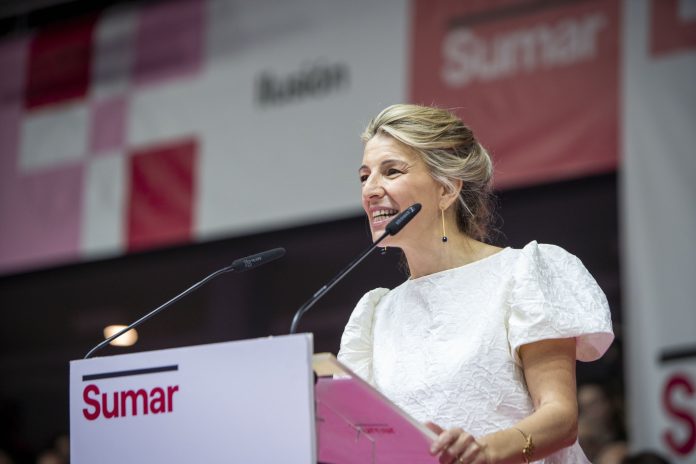Spain’s Labour Minister Yolanda Diaz launched her bid to become the country’s first woman prime minister on Sunday in Madrid in the presence of more than 3,000 enthusiastic supporters.
However, the absence of two key government ministers from the Podemos Party underscored growing disagreement among parties of the progressive left at a time when the incumbent leftist coalition government is seeking another four-year term at the general elections scheduled for the end of the year.
Diaz told the gathering that included allies from her own Communist Party plus environmental, LGBT and feminist activists, as well as the mayors of Barcelona and Valencia, that she was “humbly taking a step forward” in bidding “to become our country’s first female prime minister”. She declared that “the Spain of women is unstoppable, there’s no going back.”
The leadership of Podemos, a party formed in 2014 with a platform similar to that of Diaz’s “new Sumar” initiative, was conspicuously absent. Neither the Podemos secretary general, Social Rights Minister Ione Belarra, nor Equality Minister Irene Montero attended, reflecting the failure to reach agreement about the format of Sumar’s internal primary elections. Podemos favours “open primaries” that would enable voters to determine Sumar’s parliamentary candidate list, and wants Diaz to sign off on this. She is refusing on grounds that she needs to negotiate agreement on this with the other parties that make up her coalition.
It remains unclear as to whether Podemos will join Sumar or compete against it for support from the left-of-centre voters. Local and regional elections on 28 May are expected to reveal the extent of Podemos’s electoral appeal, and therefore the degree to which it can influence future decisions on striking a campaign deal with Sumar or whether it might opt to go it alone.
Diaz has indicated that she plans to put forward a new “bill of rights” plus a “contract” for democratic, economic and social issues for the coming decade. She cites the example of how her ministry has raised the minimum wage and introduced a pro-union labour law reform.
A recent poll by the state-owned Centre for Sociological Studies rates Diaz, 51, as the nation’s politician with the highest approval rating. Former Podemos leader Pablo Iglesias backed her to succeed him when he resigned from the cabinet in 2019 but the two subsequently had a falling out. He has since repeatedly criticised what he describes as Diaz’s cosiness with the rival Socialist Party and her failure to position herself on issues such as sending weapons to Ukraine.
Diaz maintains she doesn’t “owe anyone anything”.

